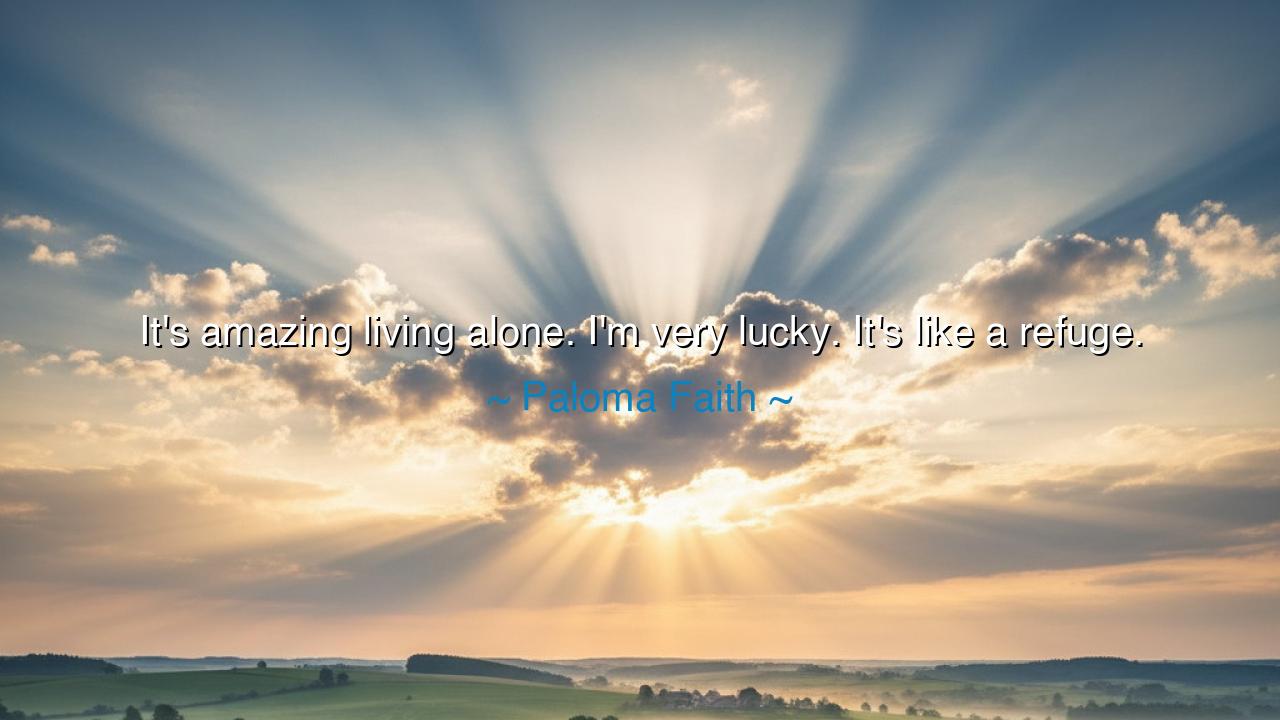
It's amazing living alone. I'm very lucky. It's like a refuge.






The words of Paloma Faith — “It’s amazing living alone. I’m very lucky. It’s like a refuge.” — flow softly, yet carry the weight of an ancient truth: that solitude, when embraced with gratitude, becomes not loneliness, but sanctuary. In these simple words, the artist reveals a wisdom that few recognize until they have walked through the noise of the world — that there is strength in stillness, and peace in one’s own company. She speaks not as one who flees from others, but as one who has discovered the sacred space of self — the quiet place where the soul can breathe freely, unjudged and unhurried.
The origin of these words lies not only in Paloma Faith’s personal life, but in the universal experience of every human heart that has longed for peace amid chaos. As a performer, she lives in a world of constant sound — interviews, stages, flashing lights, and crowds. Yet even amidst fame and beauty, she, like all who feel deeply, understood that true happiness is found not in endless activity, but in restoration of the spirit. Her “refuge” is not an escape, but a return — a return to the self that exists beneath the masks, beyond the demands, and within the silence. In a single phrase, she captures the essence of an ancient philosophy: that solitude is the temple of the soul.
The ancients themselves knew this well. The philosopher Seneca, who lived in the turmoil of Roman politics, once wrote that “he who is everywhere is nowhere.” He sought solitude not to withdraw from life, but to reconnect with his inner strength. So too did the mystics and poets of every age retreat into silence — from Buddha, who meditated beneath the Bodhi tree, to Emily Dickinson, who wrote her immortal verses in the stillness of her room. What Paloma Faith calls her “refuge,” they might have called their sanctum — a space where one can hear the quiet voice of truth beneath the storm of the world. In solitude, they found what no company could offer: clarity, calm, and the courage to be wholly themselves.
To live alone, as Paloma describes, is not merely a physical condition, but a spiritual practice. It is to dwell in one’s own presence without fear. Many shrink from solitude because they mistake it for emptiness. But in truth, solitude is fullness — a fullness that comes from the realization that one’s peace depends not on others, but on the harmony within. To sit alone in a quiet room, to wake to silence, to fill one’s hours not with chatter but with reflection — this is not deprivation, but luxury of the highest order. The artist who learns to love solitude learns to create from purity; the soul who learns to rest alone learns to love others without need.
Consider the life of Leonardo da Vinci, that towering figure of the Renaissance. Though surrounded by courts, kings, and commissions, he often withdrew to solitude, where his mind roamed freely through invention and imagination. In his notebooks, he wrote of solitude as a friend — the companion of deep thought and creation. “When you are alone, you are wholly yours,” he said. Like Paloma Faith, Leonardo understood that the mind must have a refuge — a sacred place untouched by the demands of the world. His solitude birthed not loneliness, but genius; for in quiet, the whisper of inspiration can finally be heard.
Paloma’s statement also carries gratitude, that most essential of virtues. “I’m very lucky,” she says — and in that small phrase, she reveals her awareness that solitude is not a burden but a blessing. In a world obsessed with connection, with constant communication and validation, to have time and space for oneself is a rare fortune. She reminds us that we must not pity those who walk alone, but envy them; for they have found a peace that cannot be purchased. The one who can dwell happily in their own company is never truly alone — for they carry within them a world of thoughts, dreams, and quiet joys.
The lesson, then, is both gentle and powerful: cherish your solitude. Do not fear the empty room, the silent morning, or the quiet night. These are not voids — they are refuges, where the self returns to its natural state of harmony. Take time each day to step away from the world’s noise. Listen to the sound of your own breath. Reflect, write, create, rest. In that silence, you will find not isolation, but strength; not loneliness, but freedom. Learn, as Paloma Faith has, to see solitude as a gift — a home within the heart that no one can take away.
So, O wanderer of the modern world, remember her wisdom: living alone can be amazing when one learns to be at peace within themselves. Solitude, rightly understood, is not the absence of love, but the soil in which love grows deeper. When you make your inner life a refuge, the world’s chaos will not touch you. And when you return from that quiet place, you will bring with you the calm of the mountains, the patience of the stars, and the unshakable joy of one who has made peace with their own soul.






AAdministratorAdministrator
Welcome, honored guests. Please leave a comment, we will respond soon